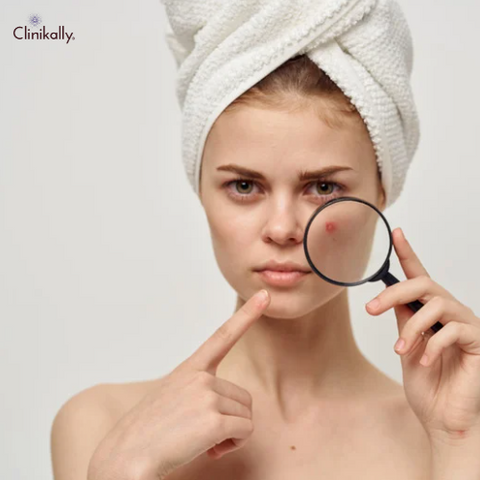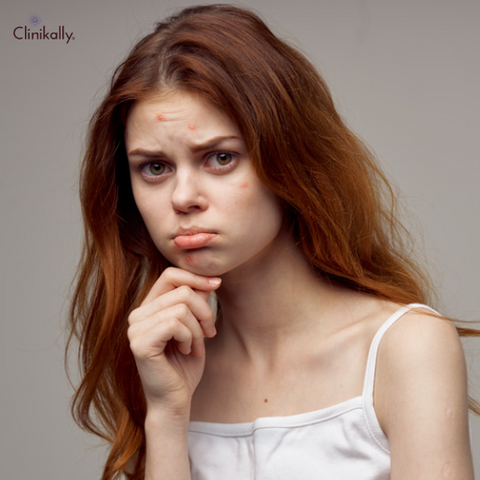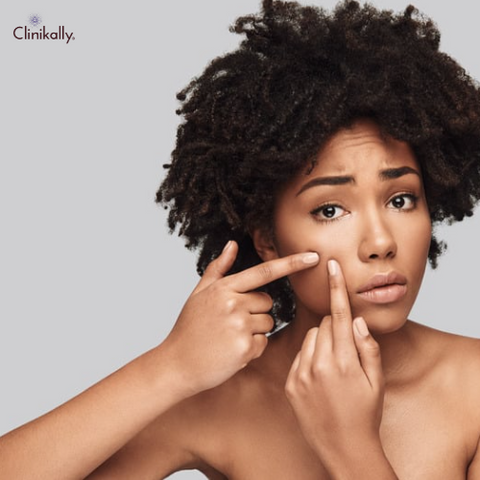Acne can be a challenging and frustrating condition, especially for teenagers who are already dealing with various changes and challenges during this period of their lives. The hormonal changes that occur during adolescence can cause an increase in sebum production, leading to clogged pores and the development of acne. While acne can range from mild to severe, it can have a significant impact on a teenager's self-esteem and social life. Therefore, it's crucial to take proactive steps to manage acne and prevent it from causing physical discomfort and emotional distress.
In this blog, we will delve into the various causes of teen acne and provide tips for maintaining healthy skin and preventing acne breakouts. We'll also discuss the different types of over-the-counter and prescription treatments available for managing acne, including topical creams, oral medications, and medical procedures. Additionally, we will explore when it's appropriate to seek professional help from a dermatologist and what to expect during a dermatology appointment.
By following these tips and understanding the causes and treatment options for teen acne, parents and guardians can help their teenagers maintain healthy, clear skin and boost their self-confidence. Moreover, recognizing when to seek professional help and working with a dermatologist can ensure effective treatment and management of acne, minimizing its impact on the teenager's life.
Understanding Teen Acne

Acne is a common skin condition that affects millions of people worldwide, but it is especially prevalent among teenagers. The hormonal changes that occur during adolescence can cause an increase in sebum production, leading to clogged pores and the development of acne. While it is a natural part of growing up, the emotional and social impact of acne can be significant. Understanding the causes and treatment options for teenage acne is crucial for both adolescents and their parents, as it can help manage the condition and alleviate its effects. In this article, we will delve into the causes of teenage acne and explore effective treatment options to help young people achieve clear and healthy skin.
What Causes Teen Acne?
Teen acne is primarily caused by hormonal changes during puberty, which can lead to increased oil production in the skin. This excess oil, combined with dead skin cells, can clog pores and create the perfect environment for acne-causing bacteria to thrive. Other factors that contribute to teen acne include genetics, diet, stress, and using the wrong skincare products.
How Hormonal Changes Affect Teen Skin
During puberty, the body undergoes significant hormonal changes. Increased levels of androgens, such as testosterone, can cause the sebaceous glands to produce more oil. This excess oil can mix with dead skin cells and clog pores, leading to the formation of pimples, whiteheads, blackheads, and in severe cases, cystic acne.
Common Myths About Teen Acne
There are many misconceptions surrounding teen acne. Some of the most common myths include:
-
Acne is caused by poor hygiene: While it's essential to maintain a consistent skincare routine, acne is not solely caused by poor hygiene. Hormonal changes, genetics, and other factors contribute to acne development.
-
Greasy foods cause acne: While a healthy diet is important for overall skin health, there's no direct link between consuming greasy foods and acne development.
-
Sun exposure clears acne: Some people believe that sun exposure can help reduce acne. However, excessive sun exposure can lead to skin damage and worsen acne symptoms.
Preventing and Treating Teen Acne

Acne is a common skin condition that affects a large percentage of teenagers worldwide, often causing physical discomfort and emotional distress. The onset of acne during puberty can be attributed to hormonal changes that increase sebum production and lead to clogged pores. However, there are various preventative measures and treatment options available to manage the condition and minimize its impact on teenagers. In this article, we will explore effective ways to prevent and treat acne in teenagers, including lifestyle changes, skincare routines, and medical interventions. By understanding the causes and treatment options for teenage acne, adolescents and their families can work towards achieving clear and healthy skin.
Skincare Tips for Teen Acne
To manage teen acne effectively, it's crucial to establish a consistent skincare routine. Here are some essential tips:
-
Cleanse the face gently twice a day using a mild, non-comedogenic cleanser.
-
Avoid scrubbing or using harsh exfoliants, as this can irritate the skin and worsen acne.
-
Moisturize daily with an oil-free, non-comedogenic moisturizer to prevent dryness.
-
Use a broad-spectrum sunscreen with SPF 30 or higher to protect the skin from harmful UV rays.
-
Encourage your teen to avoid picking or popping pimples, as this can lead to scarring and infection.
Over-the-Counter Acne Products for Teens
There are various over-the-counter (OTC) acne products available to help manage mild to moderate acne. Some of the most common active ingredients in OTC acne products include:
-
Salicylic acid: This beta-hydroxy acid helps to exfoliate the skin and unclog pores.
-
Benzoyl peroxide: This antimicrobial agent helps to kill acne-causing bacteria and reduce inflammation.
-
Alpha-hydroxy acids (AHAs): Glycolic and lactic acids help to exfoliate the skin and improve its texture.
Always follow the instructions on the product packaging and monitor your teen's skin for any signs of irritation or allergic reactions.
Prescription Acne Medications for Teens
If OTC products aren't sufficient, a dermatologist may prescribe stronger medications to help manage acne. Some common prescription acne medications include:
-
Topical retinoids: These vitamin A derivatives help to unclog pores and promote cell turnover, improving the overall texture and appearance of the skin.
-
Topical antibiotics: These medications help to reduce inflammation and kill acne-causing bacteria.
-
Oral antibiotics: In cases of moderate to severe acne, oral antibiotics may be prescribed to help control bacterial growth and inflammation.
-
Hormonal treatments: For females with hormone-related acne, birth control pills or other hormonal medications can help regulate hormonal imbalances and reduce acne symptoms.
-
Isotretinoin: In severe cases, isotretinoin, an oral retinoid, may be prescribed to help reduce oil production, inflammation, and bacterial growth.
When to Visit a Dermatologist for Teen Acne

While acne is a common condition that many teenagers experience, it can sometimes be severe and difficult to manage. In some cases, over-the-counter treatments and lifestyle changes may not be enough to clear up acne. That's when it may be time to seek professional help from a dermatologist. Dermatologists are medical professionals who specialize in the treatment of skin conditions, including acne. They can provide personalized advice and recommend effective treatment options to help manage teenage acne. In this article, we will explore the signs and symptoms of severe acne, and discuss when it may be appropriate to visit a dermatologist for treatment. By understanding when to seek professional help, teenagers and their families can take proactive steps towards achieving clear and healthy skin.
Signs that Your Teen Needs Professional Help
It's essential to recognize when your teen's acne requires professional intervention. Some signs that it's time to see a dermatologist include:
-
Persistent or worsening acne despite consistent use of OTC products.
-
Severe or cystic acne that causes significant pain, inflammation, or scarring.
-
Acne that's negatively impacting your teen's self-esteem or mental health.
-
Any signs of infection, such as pus, increased redness, or warmth around the affected area.
What to Expect During a Dermatologist Visit
During a dermatologist visit, the doctor will examine your teen's skin and ask about their medical history, skincare routine, and any previous acne treatments. They may also inquire about your teen's lifestyle, diet, and stress levels, as these factors can influence acne development. Based on this information, the dermatologist will recommend an appropriate treatment plan tailored to your teen's specific needs.
Treatments Available at the Dermatologist for Teen Acne
In addition to prescription medications, dermatologists may offer other treatments for more severe or persistent cases of acne. Some options include:
-
Chemical peels: These treatments involve applying a chemical solution to the skin to remove the outer layers, promoting the growth of new, healthier skin.
-
Microdermabrasion: This exfoliating treatment uses tiny crystals to gently remove the top layer of skin, improving its texture and appearance.
-
Laser therapy: Laser treatments can help to reduce inflammation, kill acne-causing bacteria, and stimulate collagen production to minimize scarring.
-
Corticosteroid injections: For severe, cystic acne, a dermatologist may inject a corticosteroid directly into the affected area to reduce inflammation and promote healing.
It is important to remember that acne is a natural part of growing up, and that it can affect teenagers both physically and emotionally. While it can be challenging to manage, there are various preventive measures and treatment options available that can significantly improve the condition and reduce its impact on the individual. Encouraging a healthy lifestyle, including a nutritious diet and regular exercise, can help promote healthy skin and prevent acne breakouts. Additionally, consistent use of acne-fighting skincare products, such as cleansers and topical treatments, can be effective in preventing and treating acne. However, in cases of severe acne, it may be necessary to seek professional help from a dermatologist who can provide personalized advice and recommend appropriate medical interventions. By working together, parents and teenagers can develop a comprehensive approach to managing acne and achieve healthy, clear skin.
















